
|
|
|
|
|
|
|
|
|
|
|
|
|
|
 |
|||||||
|
|
|
|
|
|
|
|
|
||
 Figure 1 -
Satellite orbit period vs. orbit radius.
Figure 1 -
Satellite orbit period vs. orbit radius.
 Figure 2 -
Satellite orbit period vs. orbit radius, continued.
Figure 2 -
Satellite orbit period vs. orbit radius, continued.
 Figure 4 -
Height conditions for a geostationary satellite.
Figure 4 -
Height conditions for a geostationary satellite.
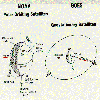 Figure 5 -
NOAA and GOES satellites.
Figure 5 -
NOAA and GOES satellites.
 Figure 6 -
GOES geographic coverage.
Figure 6 -
GOES geographic coverage.
 Figure 8 -
Solar flare effects.
Figure 8 -
Solar flare effects.
 Figure 9 -
Advanced TIROS - N (ATN)
Figure 9 -
Advanced TIROS - N (ATN)
 Figure 10 -
One-polar soundings for 00Z map.
Figure 10 -
One-polar soundings for 00Z map.
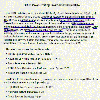 Figure 11 -
TIROS polar-orbiting environmental satellite.
Figure 11 -
TIROS polar-orbiting environmental satellite.
 Figure 12 -
Fundamental polar satellite products: AVHRR
Figure 12 -
Fundamental polar satellite products: AVHRR
 Figure 14 -
Two-polar soundings for 00Z map.
Figure 14 -
Two-polar soundings for 00Z map.
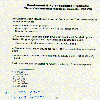 Figure 15 -
Fundamental polar satellite products: TIROS operational vertical sounder.
Figure 15 -
Fundamental polar satellite products: TIROS operational vertical sounder.
 Figure 16 -
Fundamental polar satellite products: TVOS.
Figure 16 -
Fundamental polar satellite products: TVOS.
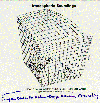 Figure 17 -
Atmospheric soundings.
Figure 17 -
Atmospheric soundings.
 Figure 18 -
Summary of fundamental polar-orbiting satellite products.
Figure 18 -
Summary of fundamental polar-orbiting satellite products.
 Figure 19 -
Derived polar satellite products.
Figure 19 -
Derived polar satellite products.
 Figure 21 -
Multispectral Scanner (MSS) sensor.
Figure 21 -
Multispectral Scanner (MSS) sensor.
 Figure 22 -
Landsat image of Detroit.
Figure 22 -
Landsat image of Detroit.
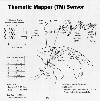 Figure 23 -
Thematic Mapper (TM) sensor.
Figure 23 -
Thematic Mapper (TM) sensor.
Related Class Images
 Operational earth observation satellites.
Operational earth observation satellites.
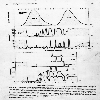 Black body emission spectra for the sun and earth.
Black body emission spectra for the sun and earth.
 Fundamental polar satellite products: HRPT
Fundamental polar satellite products: HRPT
 Fundamental polar satellite products: APT
Fundamental polar satellite products: APT
 Polar satellite communications link summary.
Polar satellite communications link summary.
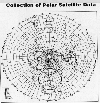 Collection of polar satellite data.
Collection of polar satellite data.
 Polar satellite communications links to processing center.
Polar satellite communications links to processing center.
 Processing data from polar satellites.
Processing data from polar satellites.
 Collection of geostationary satellite products.
Collection of geostationary satellite products.
 International weather satellites.
International weather satellites.
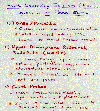 Earth Observing System (EOS): Mission to Planet Earth.
Earth Observing System (EOS): Mission to Planet Earth.
Satelllte Data Shows Global Sea Level Rise
 Upper atmosphere research satellite.
Upper atmosphere research satellite.
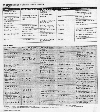 An abridged guide to climatic remote sensing.
An abridged guide to climatic remote sensing.